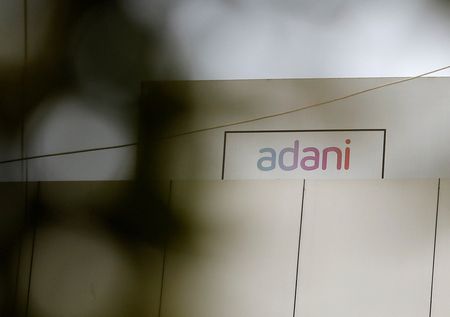 1
1 1
1

By Scott Murdoch and Shivam Patel
SYDNEY/NEW DELHI (Reuters) -Financial index provider MSCI said on Thursday that some Adani securities should no longer be designated as free float, after market participants raised concerns about the eligibility of the Indian conglomerate’s companies for some of its indexes.
Billionaire tycoon Gautam Adani has already has seen $110 billion wiped off his seven main Indian-listed stocks in slightly more than a week after a scathing Jan. 24 report by a U.S. short seller which accused the conglomerate of improper use of offshore tax havens and stock manipulation.
Analysts say a change in free float status may lead to weightings of MSCI index constituents being altered, which could possibly trigger a shifting of positions by funds as many investments globally are aligned to such indexes.
The Adani group has denied the allegations by Hindenburg Research, saying its narrative of stock manipulation has “no basis” and stems from an ignorance of Indian law.
“MSCI has received feedback from a range of market participants concerning the eligibility and free float determination of specific securities,” MSCI said in a statement.
“MSCI has determined that the characteristics of certain investors have sufficient uncertainty that they should no longer be designated as free float … This determination has triggered a free float review of the Adani Group securities,” it added.
Changes for Adani securities associated with its MSCI Global Investable Market Indexes are due to be announced on Thursday as part of its regular review for February.
MSCI defines the free float of a security as the proportion of shares outstanding that is considered available for purchase in public equity markets by international investors.
Adani group did not respond to a Reuters request for comment.
In response to the MSCI statement, Hindenburg founder Nathan Anderson wrote on Twitter: “We view this as validation of our findings”.
Some of Adani companies shares had been rebounding this week but tumbled again on Thursday after the MSCI announcement. Adani Enterprises sank 10%, after losing as much as 20% in early morning trade.
Adani Transmission, Adani Total Gas and Adani Power were each down 5%, while Adani Ports and Special Economic Zone were down nearly 4%.
“The sentiment is affected by the MSCI announcement. It will lead to outflows if MSCI removes certain stocks,” said Ambareesh Baliga, a Mumbai-based independent market analyst.
The MSCI announcement comes as the latest setback for Adani. His flagship Adani Enterprises was forced to abandon a $2.5 billion stock offering due to the market rout.
“Some investors follow MSCI index as a gauge,” said Neeraj Dewan, director at Quantum Securities. “Depending on the outcome of the MSCI review, we could see more pressure on select Adani group stocks,” he added.
The issue is snowballing politically, too.
Indian opposition parties see the affair as an opportunity to corner Prime Minister Narendra Modi, who is eyeing a third term in elections next year, as they accuse his government of giving undue favours to the Adani Group, a charge denied by the government and the company.
Sporadic protests have taken place in parts of the country as opposition parties demand investigations by a joint parliamentary committee or a Supreme Court-appointed panel into the allegations made against the conglomerate.
The short-selling attack and shelving of the share sale have tarnished Adani’s reputation.
India’s Securities and Exchange Board of India regulator is investigating the market rout, a person with direct knowledge of the matter told Reuters this week.
Moody’s rating firm has warned the share price declines could hit the group’s ability to raise capital, while India’s central bank is checking on lenders’ exposure.
(Reporting by Scott Murdoch in Sydney. Additional reporting by Chris Thomas, Bharath Rajeswaran and Rhea Binoy in Bengaluru; Editing by Edwina Gibbs, William Mallard and Kim Coghill)